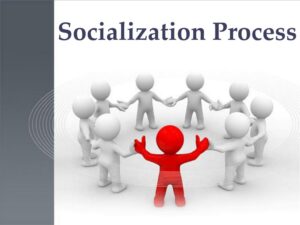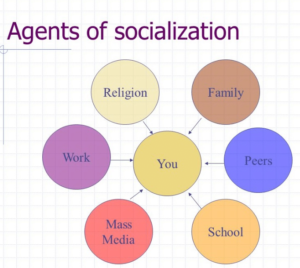Back to: Religion and National Value JSS2
Welcome to class!
In today’s class, we’re going to be talking about the process of socialization. I trust you will enjoy the class!
The Process of Socialization

Socialization is the lifelong journey through which individuals acquire the norms, values, and behaviors appropriate for their society. It’s how we learn to become functioning members of our community.
What is Socialization?
– Definition: Socialization is the process by which people learn the characteristics of their group—the knowledge, skills, attitudes, values, norms, and actions thought appropriate for them.
– Importance: It helps individuals understand how to behave in a way that is socially acceptable and allows societies to pass down their culture and values from one generation to the next.
Stages of Socialization

- Primary Socialization: Occurs in childhood, mainly within the family, where basic norms and values are learned.
- Secondary Socialization: Continues into adulthood, where schools, peer groups, and the media further influence and shape an individual’s beliefs and behaviors.
Agents of Socialization

– The Family: The first and most influential agent, teaching language, basic norms, and behavior patterns.
– Schools: Provide formal education and social skills, introducing students to a broader worldview.
– Peer Groups: Friends and peers influence attitudes, social norms, and behaviors, often shaping personality and identity.
– Media: Television, internet, and other forms of media are powerful in shaping perceptions of reality and societal expectations.
Processes of Socialization
– Imitation: Young children learn by mimicking the behavior of those around them.
– Role-Taking: Individuals learn to understand perspectives and expectations by taking on roles, such as playing ‘house’ or ‘school’.
– Incorporation of Feedback: Feedback from social interactions helps individuals adjust their behaviors to align with societal expectations.
– Observation and Learning: By observing others and learning from various situations, individuals understand social cues and appropriate responses.
Examples of Socialization in Action
– Learning a Language: Children learn to speak by listening to and imitating their parents and siblings.
– School Projects: Working in groups teaches students about cooperation, leadership, and responsibility.
– Religious Ceremonies: Participating in religious events can instill a sense of community and shared values.
– Social Media: Engaging with content online influences perceptions of self and the world.
Challenges in Socialization
– Cultural Differences: Globalization introduces diverse cultures, which can sometimes lead to confusion or conflict.
– Technology: The digital age presents new challenges, such as cyberbullying and the spread of misinformation.
– Peer Pressure: Can lead to negative behaviors if individuals are influenced by the wrong group.
Encouraging Positive Socialization
– Open Communication: Encouraging discussions at home and in school about personal experiences and societal expectations.
– Community Involvement: Participating in local events and volunteering to foster a sense of belonging and civic duty.
– Critical Thinking: Teaching students to analyze and question the information they receive, especially online.
We have come to the end of today’s class. I hope you enjoyed the class!
In the next class, we shall be discussing identifying common crimes.
In case you require further assistance or have any questions, feel free to ask in the comment section below, and trust us to respond as soon as possible. Cheers!
